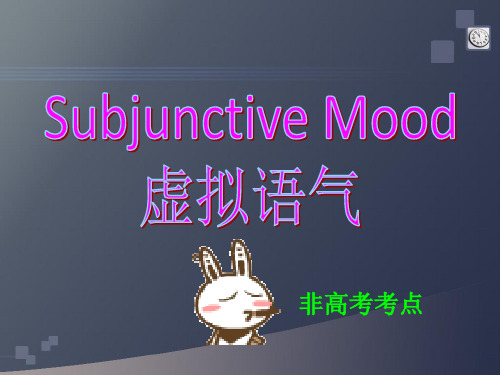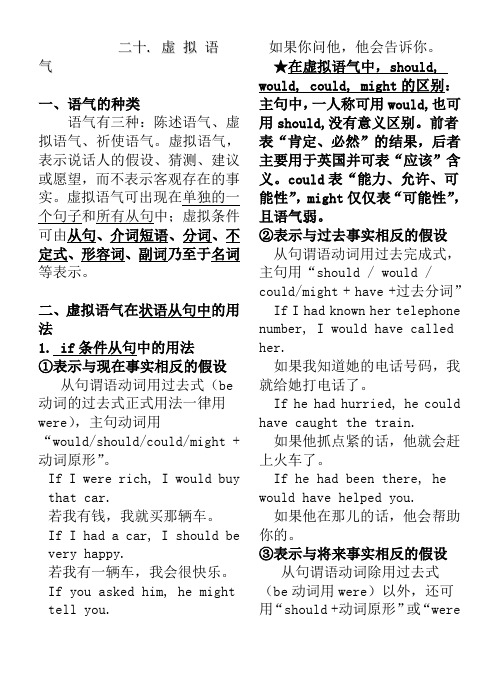语法-英文中的三种语气
- 格式:pptx
- 大小:76.98 KB
- 文档页数:2


二十.虚拟语气一、语气的种类语气有三种:陈述语气、虚拟语气、祈使语气。
虚拟语气,表示说话人的假设、猜测、建议或愿望,而不表示客观存在的事实。
虚拟语气可出现在单独的一个句子和所有从句中;虚拟条件可由从句、介词短语、分词、不定式、形容词、副词乃至于名词等表示。
二、虚拟语气在状语从句中的用法1. if条件从句中的用法①表示与现在事实相反的假设从句谓语动词用过去式(be 动词的过去式正式用法一律用were),主句动词用“would/should/could/might +动词原形”。
If I were rich, I would buy that car.若我有钱,我就买那辆车。
If I had a car, I should be very happy.若我有一辆车,我会很快乐。
If you asked him, he might tell you.如果你问他,他会告诉你。
★在虚拟语气中,should, would, could, might的区别:主句中,一人称可用would,也可用should,没有意义区别。
前者表“肯定、必然”的结果,后者主要用于英国并可表“应该”含义。
could表“能力、允许、可能性”,might仅仅表“可能性”,且语气弱。
②表示与过去事实相反的假设从句谓语动词用过去完成式,主句用“should / would / could/might + have +过去分词” If I had known her telephone number, I would have called her.如果我知道她的电话号码,我就给她打电话了。
If he had hurried, he could have caught the train.如果他抓点紧的话,他就会赶上火车了。
If he had been there, he would have helped you.如果他在那儿的话,他会帮助你的。

英文句子三语气,陈述祈使和虚拟.一、动词的语气语气用来区别讲话人对某一行为或事情的看法和态度。
英语中的语气(mood)有三种,分别是陈述语气、祈使语气和虚拟语气。
1.陈述语气陈述语气一般用来叙述事实或就事实提出询问,主要用于陈述句、疑问句和某些感叹句。
Where there is a will, there's a way. 有志者事竟成。
Can you help me carry the box upstairs 你能帮我把箱子搬到楼上吗?How I missed the life in the countryside! 我多么想念乡村的生活啊!2.祈使语气祈使语气表示说话人向对方提出请求或下达命令。
Come this way, please! 请这边走。
Don't make any noise, will you 别吵,行吗?Do be careful when crossing the street. 过马路时一定要小心。
3.虚拟语气虚拟语气表示动作或状态不是客观存在的事实,而是说话人的主观愿望、假设或推测等。
If I were a bird, I could fly in the air. 如果我是一只小鸟,我就能在空中飞行。
I wish it were spring all the year round. 但愿四季如春。
May good luck be yours! 祝你好运!二、条件句中的虚拟语气条件句中表虚拟,时态后退是真理;有be一律变成were, 我酷卖书主中坐;在含有非真实条件句的复合句中,其构成有三种形式:与现在事实相反if条件句的谓语:were did , 主句的谓:would (couldshouldmight) + do与过去事实相反if条件句的谓语:had done , 主句的谓:would(couldshouldmight) + havedone与将来事实相反if条件句的谓语:did/ were ,主句的谓:(could should might) + dowere to do1.表示与现在事实相反的条件条件从句用动词的过去式(be动词用were),主句用should(第一人称)或would(全部人称)+动词原形。

高中英语语法学习/复习讲义虚拟语气语法知识点讲义09【精讲版·全国通用】英语的语气与虚拟语气知识点总结英语的语气与虚拟语气■关于动词的语气动词的语气与我们日常生活中说的“语气”有所不同,比如我们平常说的“委婉语气”“怀疑的语气”“生硬的语气”“害怕的语气”等等,这与“动词的语气”均没有关系。
动词的语气是动词的一种形式。
根据说话意图的不同,动词需要不同的形式,这就是所谓的语气(mood)。
关于语气的分类,不同的语法学有不同的看法,有的语法学家将语气分为陈述语气、疑问语气、祈使语气和虚拟语气四种,有的语法学家将语气分为陈述语气、祈使语气和虚拟语气三种(即将“疑问语气”并在“陈述语气”之中)。
■关于陈述语气陈述语气(indicative mood)用于陈述事实或提出看法。
英语中的句子绝大部分都是陈述语气。
我们在谈论时态和语态时,都主要是指陈述语气的动词变化。
如:He did very well in the examination. 他考得很好。
She heard the front door shut. 她听见大门给关上了。
I wonder if I might use your phone. 不知可否用一下你的电话。
He lived there happily for a year. 他在那儿愉快地居住了一年。
■关于疑问语气疑问语气(interrogative mood)用于提出问题。
英语中的疑问句均属于疑问语气。
如:Where do you come from? 你是哪里人?Why are you so nervous? 你为什么这样紧张?What did you do that for? 你做这个干什么?How many windows are broken? 打破了多少扇窗户?Why don’t you think more about other people?你怎么就不多为别人着想呢?■关于祈使语气祈使语气(imperative mood)用于提出命令、要求、请求、邀请、劝告或建议等。

高中英语语法——虚拟语气知识点讲解及巩固练习题含答案1. 英语中的三种语气英语共有三种语气,陈述语气、祈使语气和虚拟语气。
陈述语气用来讲述事实,有肯定、否定、询问和感叹等形式,谓语动词有人称、时态和数的变化;祈使语气用于提出请求、建议、劝告、命令和警告等,以动词原形起句,否定式句前加Don’t;虚拟语气表示说话人所言内容不是事实,而是一种假设、愿望、建议、请求、命令或猜测,有时只是说话者的主观愿望,或表达他/她的强烈情感,谓语动词用特殊形式。
2. 非真实条件句的虚拟语气条件从句主句过去had done would/should/might/could/ought to have done现在did(be用were)would/should/might/could/ought to do将来1、did2、should do3、were to dowould/should/might/could/ought to do巧计主句中五个虚拟引导词:MS COW(奶牛女士):might, should, could, ought to, would 2.1. 与过去事实相反1). If I had had much money at that time, I would have bought you what you want.2). If you had been more careful, the mistake might have been avoided.3). If you had taken my advice, you wouldn’t have made such a mistake.4). We wouldn’t have succ eeded if it had not been for their help.5). If you had been here yesterday, you would have met the film star.6). If I had known more about giving first aid, I could have helped them.7). If you had got up earlier, you would have caught the train.8). If we had had enough rain last year, we could have gained a good harvest.9). If you had worked a little harder, you could have passed the final examination.10). If they had invited her to the party, she would have attended it.2.2.与现在事实相反1). If I were you, I would go there at once.2). If my classmates were here, they would help me.3). If I were you, I would accept the job.4). If classes were smaller, children would learn more.5). If I were ten years younger, I would start all over again.6). If I had enough money, I would buy a large house.7). If I had time, I would go shopping with you.8). If I knew all the answers to all your questions, I would be a genius.9). If he were here now, we would ask him about it.10). If I had time, I would study French.11). If I knew her number, I could ring her. (可惜我不知道)12). If there were no gravity, we should not be able to walk. (实际上地球引力始终存在。

虚拟语气的三种时态表格虚拟语气是英语语法中的一种特殊时态,用来表示假设、愿望、建议、要求等非真实情况。
虚拟语气一共有三种时态:过去、现在和将来,分别用来表示对过去、现在和将来的假设情况。
接下来我们将分别介绍虚拟语气的三种时态,并举例说明其用法。
1.过去虚拟语气过去虚拟语气表示对过去情况的假设,通常由"would/could/should/might+have+过去分词"构成。
这种虚拟语气常用于表示对过去事实的想象或推测。
例如:- If I had studied harder, I would have passed the exam.(如果我当时学习更努力,我就会通过考试了。
)- If he had gone to bed early, he might not have been late for work.(如果他昨晚早点睡觉,他也许就不会迟到了。
)2.现在虚拟语气现在虚拟语气表示对现在情况的假设,通常由"would/could/should/might+动词原形"构成。
这种虚拟语气常用于表示对现在事实的假设或建议。
例如:- If I were you, I would take the job offer.(如果我是你,我会接受这份工作。
)- If she had more time, she could finish the project by herself.(如果她有更多时间,她可以自己完成这个项目。
)3.将来虚拟语气将来虚拟语气表示对将来情况的假设,通常由"would/could/should/might+动词原形"构成。
这种虚拟语气常用于表示对将来事实的假设或期望。
例如:- If it were to rain tomorrow, we would have to cancelthe picnic.(如果明天下雨的话,我们就得取消野餐了。
语法复习十:动词的语气——虚拟语气一、语气的定义和种类l、语气:语气是动词的一种形式,它表示说话人对某一行为或事情的看法和态度。
2、语气的种类:(1)陈述语气: 表示动作或状态是现实的、确定的或符合事实的,用于陈述句、疑问句和某些感叹句。
如:We are not ready. 我们没准备好。
What a fine day it is!多好的天气啊!(2)祈使语气: 表示说话人的建议、请求、邀请、命令等。
如: Open the door, please。
请打开门。
(3)虚拟语气: 表示动作或状态不是客观存在的事实,而是说话人的主观愿望、假设或推测等。
如: If I were you, I should study English. 如果我是你,我就学英语了。
May you succeed! 祝您成功!二、虚拟语气在条件从句中的用法条件句有两类,一类是真实条件句,一类是虚拟条件句。
如果假设的情况是有可能发生的,就是真实条件何。
在这种真实条件句中的谓语用陈述语气。
如: If it doesn’t rain tomorrow, we will go to the park. 如果明天不下雨,我们就去公园。
如果假设的情况是过去或现在都不存在的,或将来不大可能发生的,则是虚拟条件句。
如: If he had seen you yesterday, he would have asked you about it. 如果他昨天见到你,他会问你这件事的。
(事实上他昨天没见到你,因此也未能问你这件事。
)在含有虚拟条件句的复合句中,主句和从句的谓语都要用虚拟语气。
现将虚拟条件从should 可用于各种人称。
l、表示与现在事实相反的假设和结果。
如: If my brother were here, everything would be all right. 要是我哥哥在这儿,一切都没问题了。
2、表示与过去事实相反的假设和结果。
英语语法总结虚拟语气虚拟语气用来表达不可能或难以实现的愿望,与事实相反的假设,通常分为基本的三种形式。
1. 与现在事实相反的虚拟:If + did / were + ..., ... would/ should/ could/ might + do (动词原形)If I were you, I would go abroad at once. (I am not you.)If he knew it now, he could help me. (He doesn't know it now.)2. 与过去事实相反的虚拟:If + had done + ..., ... would (might) have done ...If I had known your telephone number yesterday, I would have phoned you. (I didn't know your telephone number.)If you had come here a little earlier just now, you might have met her. (You didn't come here earlier.)3. 与将来事实相反的虚拟:(1) If + should + v., ... would + v. (可能性很小)(译作“万一”)If it should rain tomorrow, you could stay at home.If I should fail, what should Ido?(2) If + did / were to + v ..., would + v. (完全不可能)If the sun were to rise in the west, I would lend you the money.If you finished it in 3 minutes, I would give you my car.4. 金牌特殊重点[简单联想记忆]:●下列动词后的“宾语从句”中需要用虚拟形式,即should + 动词原形,shoud 在美国英语中要省略(TOEFL语法考点)。
衡水高中英语新高考语法复习讲义语气的三种类别(直陈、祈使、虚拟)常考知识点总结整理英语语法:语气(Mood)是一种动词形式,随着说话人意图的不同,动词需要用不同的语气。
英语中有三种语气:01. 直陈语气(Indicative Mood)表示所说的话是一种事实,动词可用各种时态。
如:I think your approach is correct.我认为你的方法是正确的。
The situation could still be remedied.局面还有挽回的余地。
How many steps go through from raw materials to products?从原料到成品需要多少工序?例题:1. Miss Wu has taught in the school .A. for ten yearsB. ten years agoC. since ten years【答案选A】句子的谓语动词用的是现在完成时,而ten years ago 用于一般过去时,所以B 不能选;for后面跟一段时间,since后跟时间起点。
2. I can see, there is only one possible way to keep away from the danger.A. More thanB. As far asC. IfD. Unless【答案选B】逗号前后并非表示条件、让步关系,也不是用来加强语气。
应用as far as I can see 来缓和语气,表示“在我看来,只有一种可能脱离危险的办法”。
02. 祈使语气(Imperative Mood)表示说话人向对方提出请求或命令等,动词可用原形。
如:Don't make a noise.别出声。
Remember to e-mail me.记得给我发电子邮件。
Please read through the instruction in advance.请预先读完说明书。